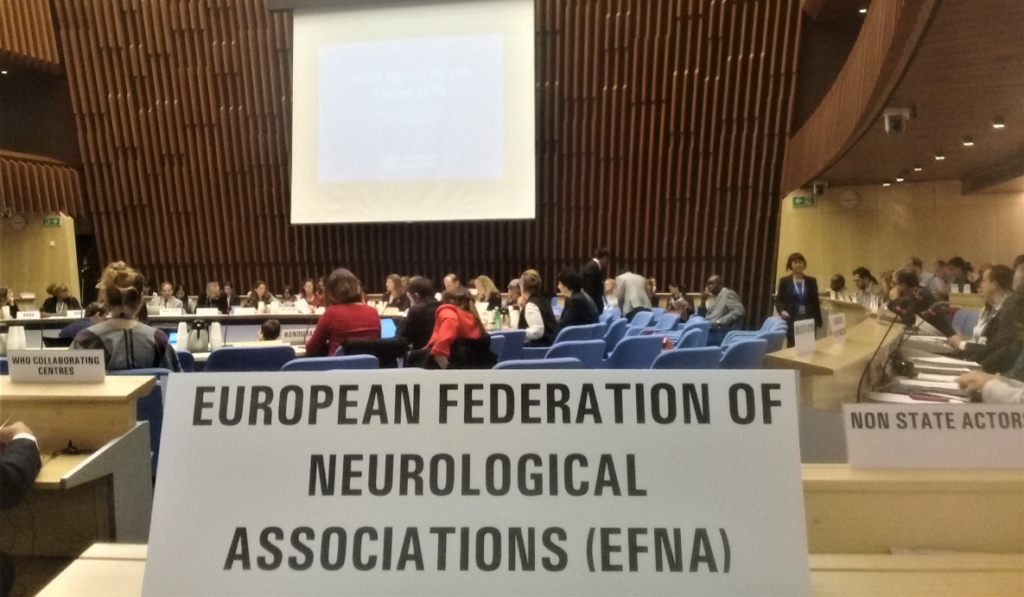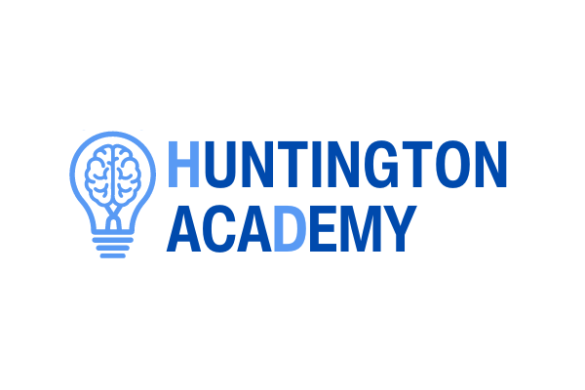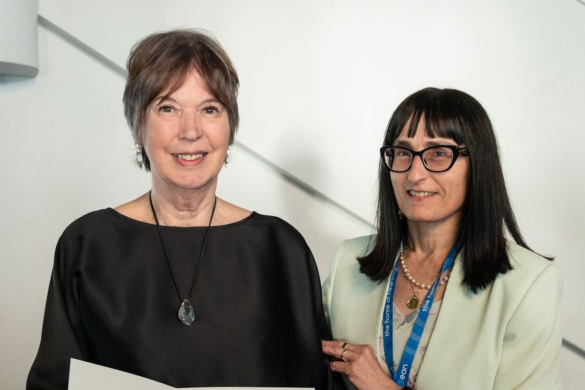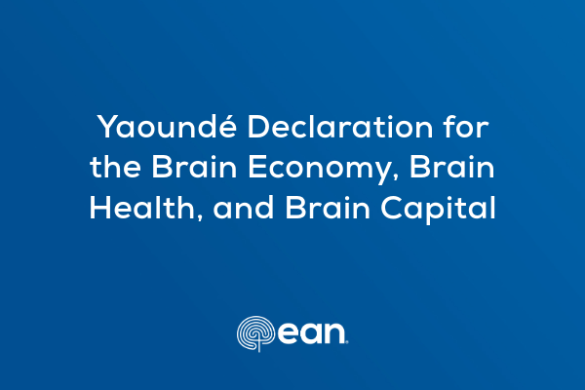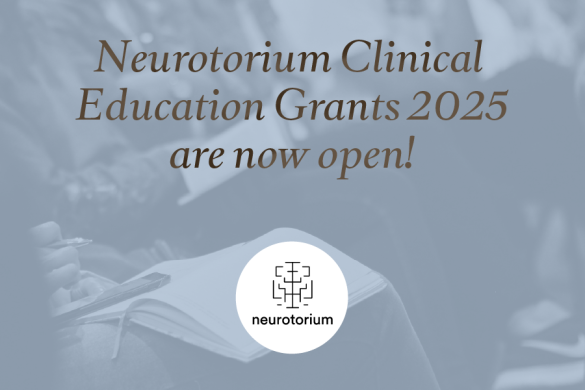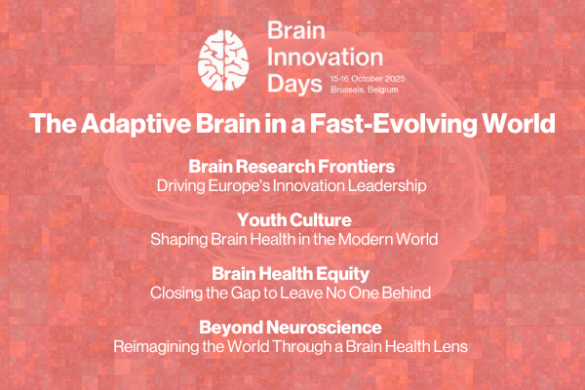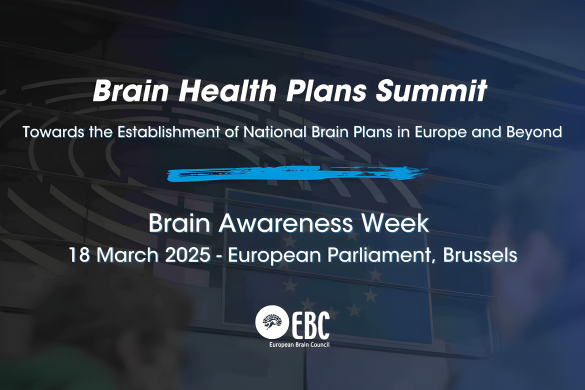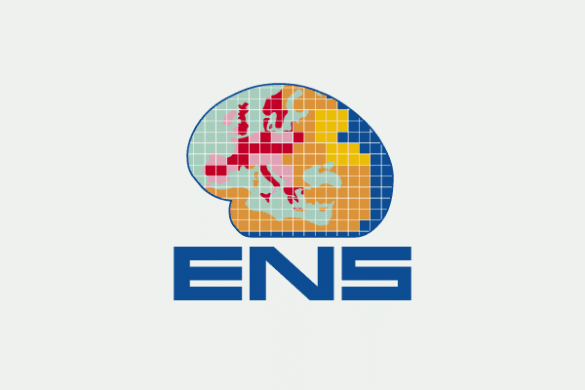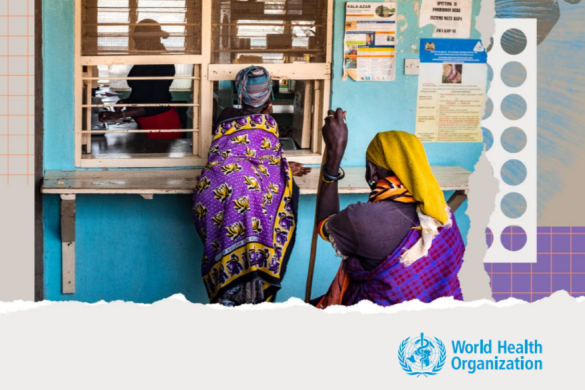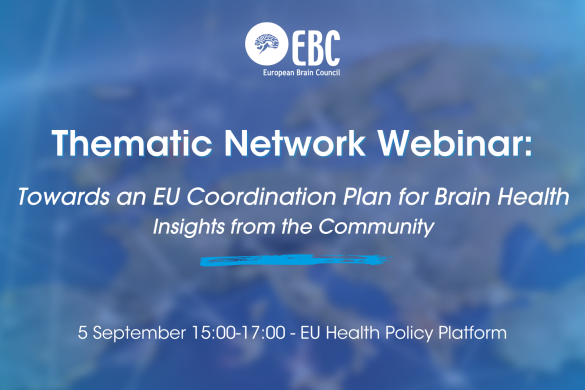Global Health – EFNA activities update
At EFNA we remain engaged with global health initiatives and actors (you can read about initial reasons for this here: Health is a shared global value).
The last couple of months have been rather eventful and EFNA’s representatives have been the voice of those living with neurological disorders on the following occasions:
Global Neurology Alliance
The World Congress of Neurology in Dubai took place in October. We participated in the Congress’ side meeting of Global Neurology Alliance. It was attended by Presidents of the World Federation of Neurology, the American Academy of Neurology, the European Academy of Neurology, the World Stroke Organization and more. The Global Neurology Alliance is a recent merger of the World Brain Alliance and the Global Neurology Network; coordinated by the World Federation of Neurology. Its main focus is brain health promotion through i) global advocacy and ii) public awareness campaigns. At the meeting EFNA’s representative called for more meaningful involvement of neurology patient representatives in both axes of the Alliance’s activities. Indeed, EFNA is now developing advocacy expertise when it comes to interacting with organizations such as WHO and our experience can be complementary to the work of the Alliance. Similarly, we have already supported public initiatives created by the Alliance e.g. on World Brain Day 2019, we coordinated policy events in four European capitals to mark the Day.
WHO Mental Health Forum
On 14 – 15 October in Geneva, EFNA took part in the WHO Mental Health Forum. The Forum is the new name for Mental Health Gap – WHO’s Programme to scale up care for mental, neurological and substance use disorders. Despite both initiatives titles focusing solely on mental health, as per the WHO approach, they are meant to include neurological health as well. And in line with EFNA’s strategy in this field, we demanded at the meeting that more visibility be given to neurology.
A major shift for the neurological community was observed at the Forum – WHO, for the first time, has publicly used the term “brain health”. This concept was the focus of one Forum session entitled: “An integrated approach to brain health”. It was meant as a consultation/conceptualization exercise in order to start a discussion with Member States on a possibility of introducing this term within WHO work. EFNA took an active part in this discussion stating that a division between mental and neurological disorders is in many cases arbitrary and emphasizing the importance of explicit mentions of neurology/brain health when appropriate, rather than only “mental health”. In terms of other lessons from the discussions, it is clear that WHO’s approach currently sees a pivotal role for prevention and risk reduction in promoting optimal brain development, cognitive health and wellbeing across the life-course.
The following slide has been displayed by WHO to illustrate their current approach to brain health:
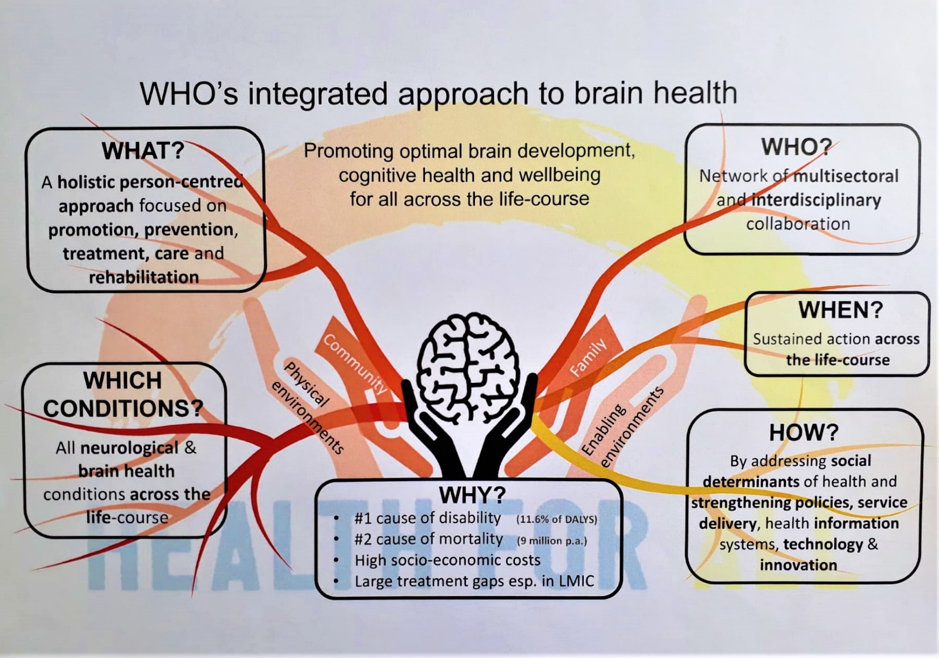
Meeting with WHO International
In July, EFNA met with WHO Europe in Copenhagen. Now, in mid-November, we went to WHO global headquarters in Geneva to meet with the Director of the Mental Health and Substance Use Department, Dr. Dévora Kestel. She was joined by her colleague, and neurologist, Dr. Tarun Dua. The so called MSD Department also covers neurology which, again, is not mentioned in its official name. We invited the European Brain Council (EBC) and the European Academy of Neurology (EAN) to join us at the meeting. Therefore, we appeared before WHO as a united voice from three key European organizations representing neurology patients, neurologists and the whole brain health space, including basic research.
Under the new leadership of Dr. Tedros Adhanom, WHO has been undergoing a major overhaul resulting in the most wide-ranging reforms in the Organization’s history to modernise and strengthen the institution to play its role more effectively and efficiently as the world’s leading authority on public health. The MSD department has also undergone restructuring which resulted in setting up three internal teams (still under development): i) Mental Health, ii) Brain Health and iii) Alcohol Dependence and other addictions. Introducing the term brain health and forming the team has been described as a paradigm shift.
Nonetheless, WHO made it clear that there are currently no prospects for changing the Department’s name. In this context, we reiterated our concerns around the terminology used by WHO and we made it clear we will continue to demand that there be more visibility for neurology in initiatives such as the Mental Health Forum or the Special initiative for mental health (2019-2023) Universal Health Coverage for Mental Health where neurology is covered implicitly, but has a very little practical presence both in initiative names as well as in listed disease areas.
In terms of future cooperation, MSD is going to develop a concept paper to better conceptualize what “brain health” means. This might be underlined by convening a global meeting as a means of consensus building. It is an area where EFNA, EBC and EAN could be involved.
Building support base from Member States
On the back of the letter we sent previously – which resulted in neurology being added to the UN Declaration on Universal Health Coverage – we continue to receive letters of support from various member states, including Australia, Austria and Sweden. They share our concerns regarding appropriate language and prioritization of brain health and neurology at the international arena.
Next steps
A number of plans are under discussion for the following year. These now include:
- Identifying supportive national missions in Geneva who will put ‘brain health’ on the agenda for the WHO Executive Board meeting in February and development of a relevant concept note
- Meeting in the European Parliament on 18th February to better align global and EU priorities
- Meeting with new WHO European Regional Director, Hans Kluge
- Planning of side event at World Health Assembly 2020
- Convening of multi-stakeholder advocacy and policy capacity-building event in Geneva, autumn 2020
- Optimising EFNA membership of NCD Alliance to garner further visibility for brain health
- Ongoing monitoring and contribution to activities of new brain health team at WHO HQ
With this, 2020 promises to be an exciting year!

